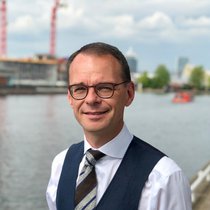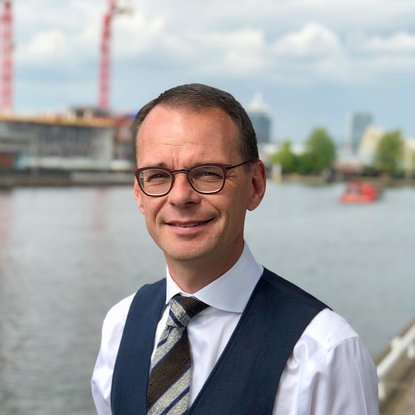Warm episodes such as heat waves increase the risk of developing heat-related illnesses, like heat strokes. The number of people exposed to extreme heat grows because of urbanization and climate change.
In short, the I-CHANGE project investigates how urbanization and climate change together affect summertime indoor air temperatures in Amsterdam and other cities worldwide.
Living Lab in Amsterdam to investigate climate change and urbanization
Together with Wageningen University & Research, Meteorology and Air Quality Section, we set up a living lab with local communities in Amsterdam. In the living lab, the researchers monitor and study the spatiotemporal character of indoor and outdoor atmospheric parameters that influence citizen’s health, like urban thermal comfort and air quality.
The research team will explain the differences in indoor temperatures between residences by factors related to neighborhood design, building architecture, and residents’ behavior.
“In total, the project works with citizens in eight Living Labs all over the world, from The Netherlands, Spain, Italy, Ireland, Belgium, Isreal and Burkina Faso. We invite residents in these Living Labs for hands-on participation in the monitoring and assessment of different types of environmental data.”
Gerben Mol
Program Developer
“Our main aim is to show that behavioral change of single citizens is possible through citizen science initiatives which are using sensors and that this has an impact of their environmental footprint.”
Gert-Jan Steeneveld
Associate professor Meteorology and Air Quality
Monitoring 100 Amsterdam homes for temperature, humidity, and CO2 concentrations
In the Amsterdam Living Lab, the research team will monitor temperature, humidity, and CO2 concentrations inside about 100 homes in Amsterdam. To monitor the factors, the researchers place a weather station in these homes.
With the temperature measurements and other collected data, the team can explain the correlation between indoor and outdoor temperatures as we have done in past research.
Furthermore, they explore whether the temperatures can also be related to the energy consumption of households, like heating in winters and air conditioning in summers.
The research project hypotheses are that indoor air temperatures during heat waves are likely to be higher in homes:
- In neighborhoods with a lack of vegetation and other cooling features;
- That have low energy labels;
- Of low-income households;
- With residents who cannot effectively block out sunlight and prevent the outside’s warm air from getting inside.
Increasing citizen empowerment and understanding
The overall concept of I-CHANGE is based on the idea that citizens and civil society have a central role in the definition of environmental protection and climate action and that their direct involvement is essential to drive a true shift and promotion of behavioral changes toward more sustainable patterns.
The project addresses the environment and climate challenges from two perspectives:
- Empowerment through knowledge acquired through hands-on participation in the monitoring and assessment;
- Understanding the role and the impact of individual choices (behavior, lifestyle, and consumption) in daily life and their consequences on the environment.
Sign up to participate!
I-CHANGE invites citizens to become part of this Living Lab. Are you living in Amsterdam and interested to volunteer in hosting a weather station in your house? The weather station that we will install in the homes of the living lab participants: Smart Weather Station Indoor Outdoor | Netatmo.
Have a look at this flyer and contact the researchers via email. Also, if you would like to become a stakeholder or partner in this research, please reach out via email.
“One of our research goals is to develop a physical model that includes the most important mechanisms to predict the changes in a residence’s indoor temperatures.”
Gert-Jan Steeneveld
Associate professor Meteorology and Air Quality
Why the clock is ticking to take action
The main effects of climate change on Amsterdam are the increase in the frequency of urban heat load, extreme precipitation, and droughts. As a consequence, the power demand and production will change too.
According to the KNMI 14 climate scenarios (Klein Tank, Beersma et al. 2014), the number of summer days (temperature max ≥ 25 °C) in the Netherlands will increase from an average of 25 days in the current climate to 50 ±15 days in 2085 (de Nijs, Bosch et al. 2019). The number of people exposed to this extreme heat is growing due to urbanization.
Heatwaves will increase in frequency and duration and tropical days (temperature max ≥ 30 °C) and hot nights will also become more frequent. For example, certain groups are more vulnerable to heat-related illness and death, such as the elderly, children, people with chronic health disorders, and people with lower incomes (Keith and Meerow 2022).
“The warmer and longer the warm and humid episodes are, the more negatively it impacts human thermal comfort and thus on human health, wellbeing and labour productivity.”
Gerben Mol
Program Developer
“This Amsterdam living lab focuses on urban heat and will try to explain and map it. These results can be used, for example, by urban designers and planners to build healthier cities. Also, from the measurements we can give advices to citizens and help them to keep cool during heatwaves.”
Gert-Jan Steeneveld
Associate professor Meteorology and Air Quality
Added value for existing climate adaptation interventions
For this project, the team collaborates with existing initiatives and engages with citizens in finding climate adaptation interventions together needed to make cities healthy places to live.
The measurement network of the living lab adds to the team's already operational network of 24 weather stations across Amsterdam, and a flux tower measuring sensible heat, evapotranspiration, and CO2 flux.
During heatwaves, the researchers add field campaigns with sodar, tricycle, and balloon observations. This video shows one of their field campaigns at Dam square in Amsterdam.
I-CHANGE project partners
I-CHANGE is implemented by 16 organizations from 12 countries (Belgium, Burkina Faso, Denmark, Finland, Germany, Italy, Ireland, Israel, Spain, Slovakia, The Netherlands, and the United Kingdom). Presenting a mixture of universities and research centers, small and medium enterprises, a think tank as well as an international body.
These bring together a critical number of leading scientific institutions in the area of climate and meteorological modeling, social and economic sciences, computer science, urban planning, impact assessment, citizen engagement, stakeholder management, ethics, and responsible research and innovation as well as communication of scientific findings through continuous storytelling and serious games.
| Duration: |
|
| Related Information: |
Principal Investigators
Project members

Gerben Mol
AMS Institute
Esther Peerlings
Wageningen University & Research
Hans Roeland Poolman
AMS Institute


